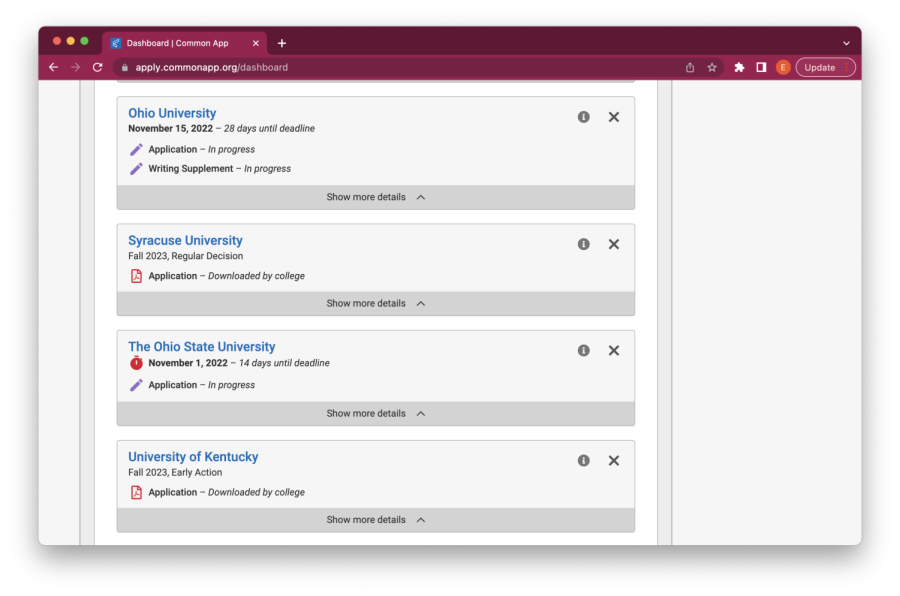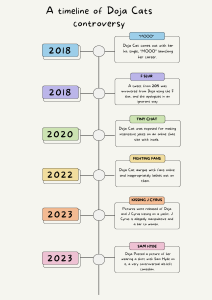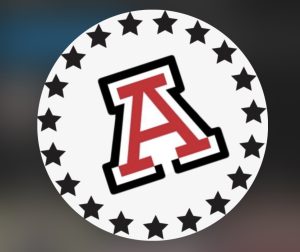10 tips for college applications
A screenshot of the Common App dashboard, showing schools and their application deadlines.
October 18, 2022
In my college application journey I’ve used many resources to help myself find direction in the seemingly never ending to do list. The most important resource I had when completing this process was my college advisor, and most of my advice comes from things she’s helped me with along the way. Without my college advisor giving me tips and guidance on my application I don’t think I would feel anywhere near as confident with my applications as I do now. Based on my experience getting ready to apply for college, these are the top 10 things I would recommend when applying to college.
1. Be Aware of Your Finances and Potential Debt
When looking at colleges, there’s no doubt that it’s important to think about your finances. I don’t know about you, but I don’t want to be paying off my college expenses into my 40s. I looked at three big factors to make a game plan…
- How much of my college expenses will be out of pocket?
- How much is tuition and board at this college?
- What will my average starting salary be based on my major?
For example, I’m paying for college entirely out of pocket. I currently have a job to set aside funds specifically for college. I know that it will be tough to handle on my own, but I’m starting to think about it now before I’m drowning in debt. I’m going to be applying for scholarships and financial aid to help me stay on top of my finances.
I’m majoring in Education and I’m aware that I’m not going to have a high starting salary/salary in general. Knowing this, I’m looking at colleges that might be more affordable and closer to home.
Knowing my financial situation and my out of college salary, I’m looking more specifically at colleges in state or that offer in-state tuition to students just outside of the state.
2. Check out the Websites of Schools You’re Interested in
Once you have some schools in mind, it’s important to navigate through their websites. On the websites, you can find major descriptions, different courses, etc. Almost every college has an “about” or “about us” tab on their website, which I would highly recommend scrolling through. Some colleges provide mission statements and/or list their goals under this tab, so I would advise you to read those and decide whether or not they align with your goals for your future. For example, I really liked OSU’s “about” page and their program really aligns with what I want to accomplish in my future.
3. Visit College Campuses and Compare
Before you commit to living on campus and having your life be somewhere new, it’s important to visit your options. If you aren’t able to physically travel to the campus, many colleges also offer virtual tours which can also be helpful. Different colleges have different dorm styles along with different student amenities. Going to the campus also allows you to get a feel for how far you’d be walking from class to class each day. You can check out the food options available to you and things outside of campus as well. It’s important to picture yourself on that campus and think about whether you can see yourself spending the next stages of your life there. How can you contribute to this community and make it your own?
4. Use the Common Application
When it comes to finding an efficient way to apply to college, the Common Application is a godsend. Everything is easy to access and it’s a pretty straightforward process. While it’s very tedious, once you get it out of the way it makes your applications so much easier. Many schools are linked in the Common App which makes it a thousand times easier to apply to the schools you’re interested in. You don’t have to apply for every school all at once either. You submit your application to each college by reviewing your application and paying an application fee. I find the common app to be helpful because you’re submitting everything through one site as opposed to several different ones. The Common App can also connect to schoolinks (another website used by JAHS for college applications) and other schools’ resources which can make the application process a few steps easier.
5. Ask for Recommendations in a Timely Manner and Early on in the Application Process
A key aspect of your application that can really help you stand out from the crowd are your letters of recommendation. Colleges can get picky about their recommendations, but, if they offer them, be sure to take advantage of that. Not every college accepts letters of recommendation, some take none, some take only teacher recommendations, some take teacher recommendations and outside recommendations, etc. It all just depends on the school. For example, The Ohio State University accepts one optional teacher recommendation so I submitted one teacher recommendation. Syracuse University has two required teacher recommendations so I submitted two. Even if the recommendation is described as optional, still submit at least one or two to help you stand out. A reminder that a letter of recommendation is a favor someone is doing for you, so you want to give them due time to write one. It might be helpful to give them a list of your accomplishments or your resume along with anything that you specifically want them to include. You want to make it as easy as possible and be very respectful to them.
6. Be Aware of Deadlines & Make Checklists
Once the ball really gets rolling in the fall, it’s easy for deadlines to get lost in the shuffle of everything. I found the application deadlines and created a checklist for myself based on those specific due dates by setting small deadlines. The regular application and early application deadlines can be found in SchooLinks and Common Application under each individual school, as the deadlines differ from school to school. I would plan to apply about a week before the deadline at the latest, in case there’s a tech mishap. Being aware of these deadlines has really helped me plan out when to complete each part of the application process and stay on top of my check list.
7. Take the Essay Seriously
Your topic should:
- Share who you are in a good light
- Be something you can write about effectively
- Be something that moves you
- Show change over time
- Be a true story about the real you
- Have a unique perspective
Topics you should avoid:
- Sports stories
- Illness
- Mission trip stories
- Stories too unfamiliar to the reader
- Divorce
- COVID-19
- Events from childhood
- Anything not about YOU
- If it makes you cringe, cry, or laugh uncontrollably then you might be too close to it
Things to remember:
- Does this sentence add to my story?
- Is this piece relevant?
- Does this sentence fit coherently into my story?
- Is this something I would tell a random stranger about?
These tips really helped me out when I was brainstorming for my essay and steered me in the right direction. I wrote an essay that I’m proud of and that I feel truly reflects myself and a key piece of my story. That being said, I wrote more than one draft when I was piecing together my essay. I had my essay most of the way completed by the end of July so that I could get adequate feedback from my peers along with my English teacher. This process isn’t something you can complete overnight so make sure you’re giving yourself the time to do these things and submit something you’re proud of.
8. Your College Application is about You
Your college application is all about you. What you want to do, where you want to be, who you are, etc. Make sure when you’re writing your application that you truly reflect yourself. Honesty and trustworthiness are two significant qualities that people look for in you whether for a college application, a job interview, or even a friend. Make sure you’re realistically representing yourself and that you’re talking about yourself.
9. Keep Track of your Accomplishments – Resume
College applications are largely about answering questions about yourself; what clubs you’re a part of, sports, organizations, jobs, etc. Having a resume makes this process much easier. You can find a Google Docs resume template and fill it out to access when college apps roll around. It’s also helpful when applying for jobs. You don’t have to create a new one each time – you can add/edit whenever you need to. It’s also something you can share with people who are writing letters of recommendation for you.
10. Ask for Help When You Need it
Asking for help can be hard but when it comes to college applications, there are so many resources at hand to help you along your application journey. I’ve found that it’s very helpful to hear different perspectives on the application process and experiences at various colleges. After talking to several teachers and their experiences at different universities, I gained a better understanding of which colleges have an education program that stands out from others.









